As Chinese and U.S. leaders have been negotiating the first-ever bilateral deal to cut carbon pollution in both countries, some local government leaders have been calling for Americans to give up on carbon-reduction efforts.
Their argument: because they think China and other countries are unlikely to reduce their carbon emissions, Americans shouldn’t try to reduce theirs.
The fight matters to transportation because it’s playing out in the Metro regional government’s Climate Smart Communities Scenarios Project, which will influence the amount of money available to spend on new roads, freeways, transit lines and off-street paths over the next 25 years.
John Ludlow, chair of the Clackamas County Commissioners, has been one of the loudest voices for more roadway spending.
“When they continue to pour in money to bike paths they take it away from roadways,” he told the Portland Tribune for an article this week. “Freight can’t use a bike path.”
The Tribune piece goes on to quote other Clackamas commissioners:
“I am a big-time skeptic of human-caused climate change,” Ludlow says, adding that even if Climate Smart is successful, countries like China will quickly counteract it. “It’s great to do this if one believes in it, but it is just a drop in the bucket on the world scale.”
Commissioner Martha Schrader says there are other benefits to be realized by improving transportation solutions, such as air quality and economic inequity.
“I do think the climate’s changing, I don’t know if we’re causing it or not, but oh well,” Schrader said during an Oct. 21 board meeting.
“I think that’s the issue,” replied Commissioner Tootie Smith. “Whether it’s manmade or not or would it happen anyway, despite our efforts?”
Metro spokesman Craig Beebe is quoted talking about the downsides of widening roads that are free to use:
“In the long-run, congestion actually ends up being really bad anyway because that lane fills up with more cars,” Beebe says. “On its own, it wouldn’t get us to the goal that we need to get to.”
“So?” responds Ludlow. “For 20 years we’ll be able to move more people, we’ll be able to move more freight. It’s pretty lame, I think, to say: well, why do it at all, it’ll just fail eventually.”
Advertisement
Two weeks ago, as we reported, the same commissioners were arguing that wider streets and highways actually reduce carbon emissions.
Metro’s Regional Transportation Plan already allocates 58 percent of the funding on its “constrained” project list to streets and highways. About 36 percent would go to transit projects and 6 percent to dedicated biking and walking projects. (Many street and transit projects also include sidewalk and bike lane upgrades, however.)
Even as Ludlow and his peers are lobbying Metro for more money to widen their roads, they’ve launched a slickly designed website documenting Clackamas County’s $17 million road maintenance shortfall, part of an effort to build political support for a local tax or fee.
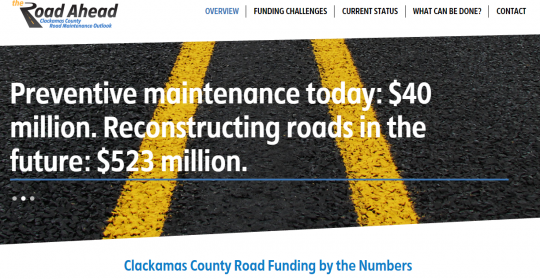
Metro grants for new transportation projects, which flow from the federal gas tax, do not come with additional maintenance or operation commitments.
Metro is facing a Dec. 31 deadline from the state legislature to pass its Climate Smart Communities Strategy, which is intended to cut tailpipe pollution 20 percent by 2035. The Metro Council is planning to vote on the strategy next month but is first hoping for the consensus their major initiatives usually enjoy among all local elected officials.
After a climate strategy is approved, the debate over road funding ratios is likely to continue as the region spends the next four years negotiating a new 25-year Regional Transportation Plan, its multibillion-dollar project list of future infrastructure spending.
Bicycle Transportation Alliance Advocacy Director Gerik Kransky, sitting in at a joint Metro meeting last week to resolve these issues, used strong language to describe what he saw going on.
“I’m shocked by the apparent disdain some of these people have for our legitimate effort to reduce carbon emissions from transportation,” he tweeted, saying that a minority of local politicians “appear desperate to resist a comprehensive approach to addressing climate change. … I hope sane minds can prevail on this question.”
In related news, Metro is soliciting applications for citizen members of its influential Transportation Policy Alternatives Committee.



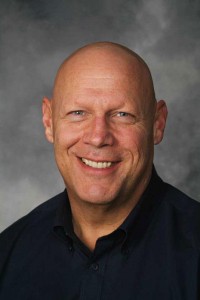
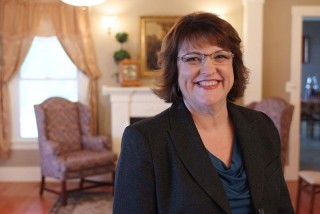
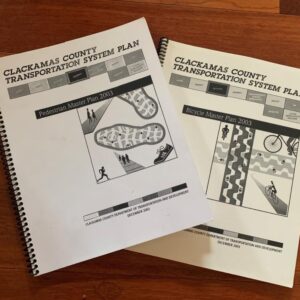
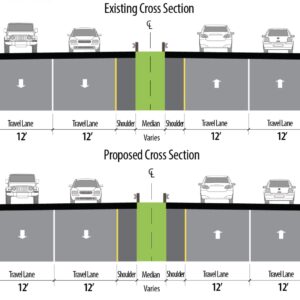
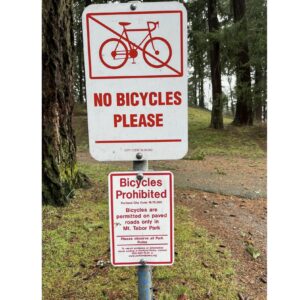

Thanks for reading.
BikePortland has served this community with independent community journalism since 2005. We rely on subscriptions from readers like you to survive. Your financial support is vital in keeping this valuable resource alive and well.
Please subscribe today to strengthen and expand our work.
Sounds like Ludlow really hasn’t studied transportation issues.
Or science.
““I am a big-time skeptic of human-caused climate change,” Ludlow says, adding that even if Climate Smart is successful, countries like China will quickly counteract it.”
If—as Ludlow seems to believe—we are not able to change the climate, then how is China able to counteract our local efforts? I don’t think Ludlow is fit for the office he holds if he can’t make any more sense than he does in the passages quoted in this article.
Makes me realize that our Clark Co. commissioners aren’t the dumbest local politicians. My miniature poodle has more brain cells firing at any given moment than Ludlow and Smith combined.
As Atrios says:
With gas prices falling, now would be a good time for states to stick in a 5 cents/gallon gas tax increase.
Not that it’s going to happen.
I’d venture to guess that Ludlow et al. see transportation spending not primarily as an issue on its own but as a front in some culture war. Bike lanes only encourage the “wrong” sort of people to relocate to Clackamas Co. (where “wrong” means “people who don’t vote as he does”).
More subtly, I suspect that he interprets money spent on bike infrastructure as evidence of Metro’s growth in policy power vis-a-vis county and city government. (This was at the heart of his work to undermine the MAX expansion to Milwaukie.)
Given that Metro actually does limit the sort of loosely regulated suburban growth I suspect Ludlow sees as conducive to his sort of lifestyle, he’s not entirely irrational on this point. It’s just that he fights silly proxy wars rather than having the courage to argue for (and defend) Atlanta-style sprawl.
John Ludlow only hates us because we run stop signs, blow lights, bike on sidewalks, ride in the middle of the lane, and block gas stations. And every time someone irritates a driver or associates cycling with climate change the John Ludlows of the world only get angrier. We will only see broad-based support for cycling emerge if we try harder to make John and others like him like us.
Remember everyone:
*Be polite.
*Always smile.
*Share the lane!
*Don’t dress funny.
*Remember that physics always wins!
*And have empathy for the inconvenience we cause. (They could just be having a bad day and…then they see…a *CYCLIST*.)
“What if it’s a big hoax and we create a better world for nothing?”
That’s from one of my favorite comics: http://verticalrising.com/wp-content/uploads/2014/02/Climate-Cartoon.jpg
That’s funny. Once upon a time I counted myself as a skeptic of anthropogenic climate change. It was (and is) obvious that the climate is changing, but the argument that there were natural explanations like solar variability or normal cyclical factors still made more sense to me. But even then I was a big proponent of reducing fossil fuel use. Because why wouldn’t you want clean air? Why wouldn’t you want clean water? Why wouldn’t you want cheap renewable energy and energy independence? These days I’m sold on the scientific case for human carbon emissions driving climate change, but it doesn’t change the fact that this stuff was a good idea all along.
Ludlow is, I believe, a contractor, so he’s ethically unfit to hold any public office that deals with land use.
I couldn’t stop wondering what this guy drives. This starts to paint the picture…
(and I wouldn’t be surprised if it’s tricked out to roll coal).
“Ludlow is, I believe, a contractor, so he’s ethically unfit to hold any public office that deals with land use.” Dave
Unless you’re just joking, I wish you’d explained why you think so.
Ludlow’s ethics may be well fit for public office dealing with land use, even though his ethics may be not be universally politically correct. People voted the guy in to hold a position on the board, meaning plenty of people in Clackamas County may agree with his ethics regarding land use.
There’s lots of different types of contractors. All of them are business, which is money, and part of the economy, which many people rely on to be healthy and growing.
People that disagree with him about his views, and that hope to persuade others that there’s a better way to do things, are going to have to do better than assume he’s not too bright, or isn’t sufficiently educated relative to land use issues. Underestimating the appeal of Ludlow’s values and ethics to the people he’s been appointed to serve, is a big mistake.
Use of the road to move freight isn’t what’s jamming the roads up. Far too much use of the road with personal cars is what’s jamming the roads up. For firsthand proof of this, view traffic during rush hours, looking down from overpasses above any major highway in the Metro area. Also, see different types of examples indicating this problem on secondary roads between communities.
It’s a vain, futile hope, that widening roads will be able to meet growth needs that under current community design strategies, results in ever increasing numbers of motor vehicles used for travel on the road.
For the short term, road construction of any type can produce positive results such as jobs and other income to people. Ultimately, it gets down to what kind of community people want built, to live in.
If people want to live in communities that puts them directly in or next to motor vehicle traffic levels that for many hours of the day are incessant, noisy and dirty, then fine…just go on widening roads as has mostly been the procedure for meeting growth travel needs in the Metro area for decades. I think people increasingly are disillusioned by the road widening to meet growth needs strategy. The strategy no longer really works in our area.
Well, it’s mostly true. What’s also true is that most freight shouldn’t be on the roads – it should be on rails and ships. Regional deliveries could and should be done with much smaller trucks, and local deliveries either with something that looks like a Smart Car on steroids (think Euro delivery trucks) or with cargo bikes and trailers like those used by b-line, soupcycle, and Portland Pedal Power. It’s only because the USA has large, wide, flat and straight roads that we can have giant trucks – efficiency and economics basically mandate them over time. But we already have efficiency vehicles for long-haul travel – rail, ships, and pipelines. It’s time to use some regulatory powers to start putting back some of the safeties we’ve removed through de-regulation over the last 50 years. De-regulation didn’t work. It increased wealth disparity dramatically, it removed safeguards which prevented the abuse of corporations – especially in industries which have monopolies or reduced competition (tri-opolies? I’m looking at you, auto industry – which in the US is now a duopoly).
Clackamas County seems to be moving farther and faster backwards each year, and as a former resident, I think that’s a very disturbing trend.
“…What’s also true is that most freight shouldn’t be on the roads – it should be on rails and ships. …” picio
Maybe, if there were plans and initiative to build a freight system that could supply freight with limited use of the roads. The Portland Metro area has no such rail network. Union Station’s rail yard is but a small percent of the size and handling capacity it once was.
And fundamentally, as I wrote earlier, the source of congestion on the roads is primarily due to excessive car use, rather than long haul trucks. Design communities to require less personal travel. Possibly consider reasonable ways to encourage people to reduce the number of daily commutes by motor vehicle per week between communities and cities. Then, possibly consider starting to introduce expanded rail networks that could deliver freight between communities without use of the road.
Union Station? Seriously? What freight companies even operate in downtown Portland?
Have you not seen Brooklyn or Swan Island? Those are very large freight rail operations. There is also one in NW Industrial, not to mention the actual ports with their multimodal rail access.
In referring to Union Station and its rail yard, I’m thinking of that rail centers’ long ago service as part of a major means of freight transport across through Oregon.
I think an extensive rail network on that order, or even more extensive, is what may be required to meet freight transport needs, if as Matt Picio suggests, the road were to be used far less than they are today for the transport of freight.
Trying to remember how many years back it was that what seems to be about seventy five percent of Union Station’s rail yards were pulled out to create land for the condos that are there now. Twenty years or so, I suppose.
I think I read it on this site once – there is an upside to the gridlock. Congestion Saves Lives.
Help two people out of their cars and onto bikes, transit or vanpools, and you just created lane space for a fully loaded semi!
I would support funding a multimodal bridge from Oak Grove to Lake Oswego with connections east and west, paid for in part with tolls.
When I walk my dog each morning I pass a Frito-Lay delivery truck making its stop at a Clackamas County Safeway. It’s an electric truck and good sized.
Perhaps what the commissioners should be recommending is a serious of railroad-centered sites at which goods could be transferred to fleets of electric trucks for delivery to stores and businesses.
This might create more jobs and reduce tailpipe pollution.
I am a Clackamas county resident and small business owner, and I will be working hard to ensure that Ludlow and Smith are neither one re-elected.
If he wants to hold public office he should run for Congress–at least there some of the votes he takes will be less directly connected to land use. What do local officials have authority over that are not connected to land use?
“…What do local officials have authority over that are not connected to land use?” Dave
Someone else reading here may be able to answer the question better. Because I couldn’t come up with a ready answer, I did a web search for ‘what do county commissioners do’. That brought up a page of links whose summaries suggest fairly consistent explanations. Better for you to check them out than for me to try detail them here.
Basically though, what I understand, is that the county commission is local government whose range of decision making extends only to issues occurring within county boundaries, rather than across the state, the nation, or further. Commissioner are voted in to represent the people in the county, their constituents, hopefully make good decisions that will beneficial to area livability. Issues relative to land use is naturally one of the things they have to study and make decisions on.
Like the Sellwood Bridge, they want to use it or roads they want built, but for some reason always seem to leave their wallets at home.
Their slick sign needs a counter: Fight climate change today $20 trillion. Dealing with in the future $2,000,000,000,000,000,000,000,000,000….